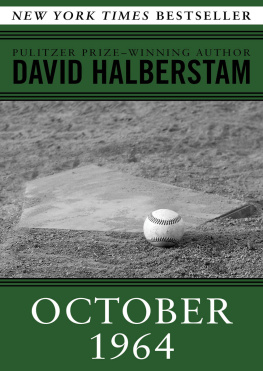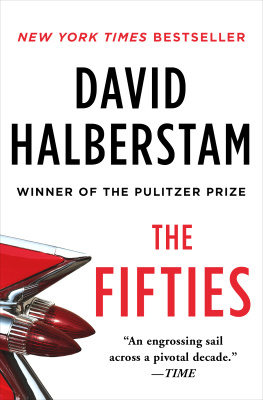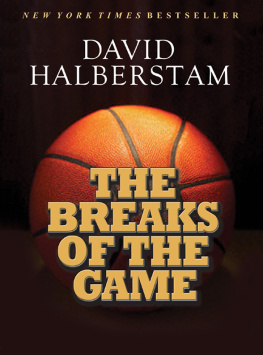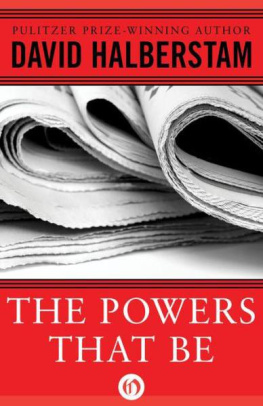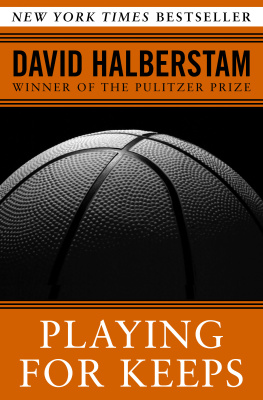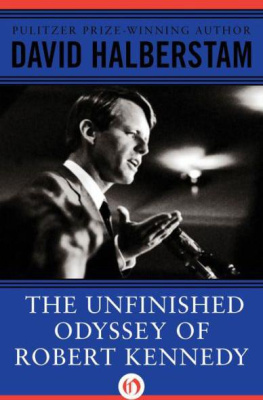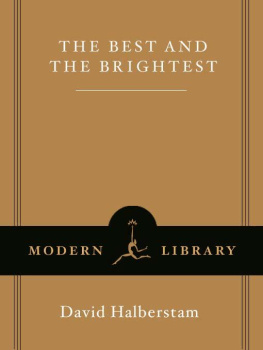October 1964
David Halberstam

For Bill Euler and Andy Oates
There is nothing more vulnerable than entrenched success.
GEORGE ROMNEY, speaking to the author about the fate of General Motors in the 1980s
Prologue
IN THE SPRING OF 1964, the young Chicago Cub outfielder, rejoining his team in Arizona, was determined that this season he would finally make his breakthrough. It was his third full year in the major leagues, and he was approaching a critical point in his career. His employers were no longer confident of his abilitiesand with good reason, for he had played well below his potential so far. The men who ran baseball, he believed, gave you three years to prove yourself, and in his first two years he had ended up right on the margin: he had not fielded well and had proved to be only a .250-.260 singles hitter. To their eyes that made him at best a journeyman, in an age when baseball teams did not keep black journeymen around on their benches.
Still, Lou Brock, child of rural Southern sharecroppers, was confident that he had the talent to play in the big leagues. The Cubs, intrigued by his promise as a college player (and particularly by his great speed), had paid a handsome bonus to sign him, a great deal more than most young black players were getting at the time. But so far he had given only the slightest hint of the skills that they and the representatives of competing organizations had seen. One Chicago sportswriter, Bob Smith of the Daily News, had written brutally about his playingnot always unfairly, Lou Brock later thought. After one play in which Brock had been thrown out trying to take an extra base, Smith wrote that he had pulled a Rock, as in Brock. Then, in the 1963 season, Smith announced, If you have watched all the Cub home games thus far you probably had come to the conclusion that Lou Brock is the worst outfielder in baseball history. He really isnt, but he hasnt done much to prove it.
Brock was about to turn twenty-five. He was aware that the other young Cub players his own age were just hitting their strides and beginning to move ahead of him: his friend Billy Williams, a year older than Brock, had hit 25 home runs and knocked in 95 runs in the 1963 season; Ron Santo, a year younger than Brock, had hit 25 home runs as well, knocking in 99 runs. Perhaps, Brock thought, 1964 would be his turn. Some of his teammates thought him withdrawn, and they found it hard to gauge his emotional state. Some in the press and in the stands considered him too casual about his job, but that was a misperception. In fact, he was driven, not merely by a desire, but by a rage to succeed. He was determined to show the people who owned the Cubs, the sportswriters on the Chicago papers, and, most of all, his fellow players in the National League that he would not be merely a good major-league player but a great one. Those disappointed by his performance during those first two years would have been surprised to learn that in his need to leave behind the memories of a sharecroppers life and seize on this rare chance to be a major-league ballplayer, he had wound himself so tight that he was unable to utilize his great natural abilities.
If some people in Chicago thought Brock not motivated enough, his Cub roommate, Ernie Banks, thought him too motivated, to the point that he had lost that most critical of athletic abilities: to relax and just play. In fact, Brock was so tense that he had trouble sleeping and eating. Banks, who recognized Brocks fierce ambition, told his friend again and again to relax, that he was blocking his baseball abilities. Unlike most young ballplayers, Brock kept records of every game he played inwhich pitchers he had faced, what pitches they had thrown him, and how well he had done against them. Banks had never seen a player so determined or goal-oriented. Before a road trip, Brock would write down how many hits he should get and how many runs he should drive in. He talked all the time about how he had to make it as a major-league star, about how it would mean a life of success and affluence; whereas failing would send him back to the extreme poverty from which he had come. Ive got to make it here, Brock would say again and again. I just cant go back to Louisiana and Arkansas. Ive been there, and I know whats there. I am here to play baseball, Banks would think, but Lou is here to fight a war. Banks worried that Brock was getting no pleasure from the game; he was sure that the more pleasure you got, the more naturally and the better you played.
Brock faced an additional early handicap. The Cubs played him in right field, which in Wrigley Field was the sun field, a truly murderous place for young outfielders. Because Brocks minor-league career had been so briefone season in Class C ball in Minnesotahe had never learned how to play a sun field. He had arrived in major-league baseball as a promising rookie, and yet no one had ever taught him how to flip down his sunglasses when a ball went into sun. As such, he not only kept losing balls in the sun, but worse, even when he did catch one, it appeared to be something of a life-and-death struggle. Playing on the road did not bother him, nor did playing on cloudy days in Chicago, but the mere thought of playing sunny day games at Wrigley would make him break into a sweat. If he misplayed a ball, the Cubs manager and coaches would have someone hit balls to him early the next morning, but somehow no one had yet figured out that the missing piece for him was how to handle the sun.
Brock had yet another worry as he arrived at spring training that season. The coaches saw him as a leadoff hitter, but, like most hitters, he believed himself a power hitter when he first reached the major leaguesfor he had hit in the middle of the order in college and in the minor leagues. Suddenly he was supposed to hit at the top of the order, and the whole purpose of each at bat changed: he was to get on base, rather than to drive the ball. Some of the Cubs coaches were trying to mold him into becoming like Richie Ashburn, a classic leadoff hitter who knew how to hit to the opposite field and how to take a lot of pitches and draw walks from pitcherson four occasions Ashburn had led the league in walks. But that was not Brocks style. He did things that Ashburn could not do, he had more power and speed than Ashburn, and he did not want to be made into a black Ashburn. He hoped the coaches would not try to mess with him anymore, that they would just let him hit. He feared that the Cub management might send him back to the minor leagues for more seasoning. That thought terrified him.
OCTOBER 1964
1
THE YANKEES ARRIVED AT spring training as confident as ever. Their marquee namesMaris, Mantle, Fordstill inspired awe and fear among opponents. Most Yankee players as well as their fans remained confident about the coming season, which promised to mark the fifteenth year of a Yankee dynasty that had started with the arrival of Casey Stengel: since 1949 the team had won the pennant thirteen times and the World Series nine times. Yankee fans expected now that their team would always manage to win the pennant. In those years the Yankees were a spectacular, finely honed machine. They depended on a deep farm system so skillfully run that when critical parts of the team wore down, new and perhaps even better parts were always found. If by some chance the farm system failed to deliver, it was so rich in other parts that a three-for-one trade could be worked out with some hapless have-not franchise. This was the case with Roger Maris, the right fielder who, with his short, compact swing, appeared to have been born to play in Yankee Stadium, and who only three years earlier had not only beaten out Mickey Mantle for the annual home-run title but also broken Babe Ruths record for home runs in a single season as well. The Yankee players themselves had come to believe in their invincibility. They were not merely the best, they were the toughest players as well: they almost always won the big games, and because they had played in so many big games, they were therefore better prepared for the terrible pressures of a pennant race or a World Series. It was simply part of being a Yankee. All the best young players, it was presumed, wanted to play for this, the most celebrated sports franchise in America, not only because of the pride of playing with the best but also because of the lure of so many World Series bonus checks. In 1963, after Steve Hamilton joined the Yankees as a relief pitcher, Clete Boyer, the third baseman, showed him his World Series ring. As Hamilton admired it, Boyer said, Listen, Steve, the good thing about the Yankees is that you dont just get a ring for yourself. You get yours the first year, then you get one the next year for your wife, and the year after that for your oldest kid, and after that for your other kids. Boyer himself already had four World Series rings. Just as Boyer predicted, Steve Hamilton got his first ring that year. The rings, along with the World Series checks, were built into the expectations of being a Yankee in those years. It was part of the lore of the team that Charlie Silvera, the Yankee backup catcher for much of that period, cashed seven World Series checks for some $50,000 (the actual total was $46,337.45)a huge amount of money in that era, particularly for someone who had played in only one World Series game. Silvera would come to refer to the lovely house he bought in suburban San Francisco as the house that Yogi built, after the Yankee catcher whom he had played behind all those years.

